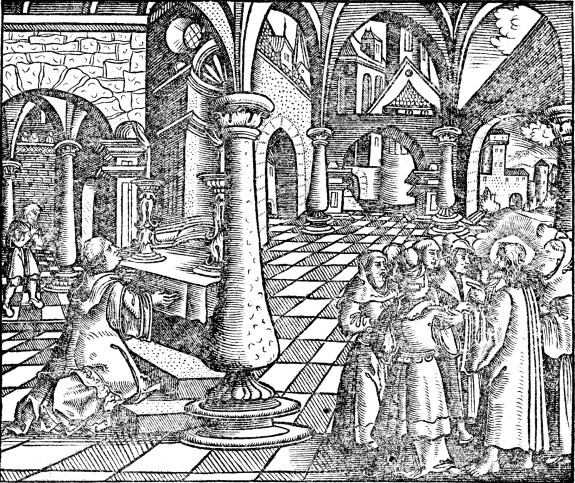
Lessons: Genesis 4:1-15, Ephesians 2:1-10, Luke 18:9-14
Hymns: LSB 593, 559, 737, 585, 746
Grace, mercy, and peace to you from God our Father and our Lord and Savior, Jesus Christ. Amen.
Do you ever feel the need to prove that you are a Christian? Maybe your sins weigh you down and you figure you need to somehow counteract that by demonstrating that you remain a Christian. Maybe you’re with someone who seems to be some sort of super Christian, and you feel you need to keep up with that person. Perhaps you’re trying to show God why you feel you should remain in His grace.
When visiting with parishioners and non-parishioners, for whatever reason, some feel compelled to prove to me their Christianity. Some do so by talking about the good things they do for others, which as we know won’t earn our salvation. Others do so by talking about what church they belong to, even if they don’t bother attending it. Others try to show me they’re Christian by saying, “I say my nighttime prayers.”
Of course, doing good works are not optional for us Christians. In fact, they serve the neighbor and supply the proof that faith is living. Belonging to a church and attending is necessary to sustain faith and fulfill God’s will in upholding the Third Commandment. And saying prayers is what God expects of us. For God tenderly invites us to pray to Him and promises to hear us.
In today’s Gospel, two men go to the Temple to pray. One is a tax collector who’s a Jew working for the Roman government. His own people viewed him as a traitor, and tax collectors were notorious for overcharging taxes and getting rich off their neighbors. The other is a Pharisee, a religious elite who would have been well-liked by the people.
When the Pharisee prays, he says, “God, I thank you.”
So far, so good. He goes to God’s house to pray. He’s addressing God. He’s thankful.
His prayer continues: “God, I thank you I’m not like other men—extortioners, unjust, adulterers, or a tax collector.” What kind of thanksgiving is that? God, thank you that I’m better than all those evil people out there. That’s a passive-aggressive way to put down everyone else. It is utter self-righteousness—the very kind of righteousness God despises.
Many of the reformation-era woodcuts illustrating this Gospel account depict the Pharisee as a monk. Many monks were similar to the Pharisees in Jesus’ day, as they focused on their works and even bragged about them. I think in our day, a good illustration would show someone on his easy chair. He’s too good to come to church. He doesn’t attend because he’s bothered by all the hypocrites he knows who are going to church. And so, he thinks he’s better off praying by himself at home.
But do you know what? They are the ones who self-righteously assert their piety and desire to separate themselves from those whom they perceive are the sinners. They’re no different than the Pharisee in this parable. What they don’t realize is that they remain soiled in their sin—dead, in fact, in their sins and trespasses—for in their self-righteousness, they fail to receive the only righteousness that counts toward the salvation of sinners—the righteousness of Christ. They are so bothered by others, they forget that they are to go to church to receive Christ’s righteousness through Word and Sacrament.
Even though the Pharisee regularly fasted and gave tithes of all that he received, he did not go home justified. That is, he did not go home forgiven. He went home guilty with his sins—as soiled in them as when he arrived.
It is true, he went home feeling pretty good about himself after telling God the way he saw things. And even though he felt he stood in the grace of God, he did not. As much as he tried, he could not make himself alive. His attempts to prove his Christianity was living a lie.
One reason why God wants you to be in church every Sunday and why He wants you to be reading your Bibles at home and reading faithful devotional literature is that God wants you to be confident of who you are in Christ. He wants you to have confidence in your salvation. In fact, the Scriptures teach us to make our calling and election sure (2 Peter 1:10)—to be confident that you are called by the Gospel and elected into God’s eternal kingdom.
But where do you place your confidence? The Pharisee placed his confidence in himself. He figured all is good in his standing with God, because he did not take seriously God’s command to be perfect. He figured his sincerity is what God cares about. He did not understand that that all those commands to use spotless lambs for sacrifice in the Old Testament ceremonial law meant that he himself had to be truly spotless. Because he created his own standard for this spotlessness, he looked at what he did and didn’t do—he gazed inward. That’s exactly where Satan wants us to be. He wants us to focus on ourselves. That way, after we have placed our confidence in ourselves, then he can begin to tear us down, making us feel worthless. Then our earthly props give way, and we lose that footing of which we were so sure.
The better way is demonstrated by the tax collector. He couldn’t even look up. He stood in the distance. His sin weighed him down. Some would conclude he was too busy naval gazing—that he’s too focused on himself. But he wasn’t. He was confessing his sin to God. And he was pleading for the mercy of Christ.
Only the faithful can do such things, for they trust that God will forgive them. They know only One Person suffered God’s wrath as He bore the world’s sin in His Body.
What’s interesting here is word the tax collector uses for mercy. It’s not the word normally found in the New Testament, meaning compassion or pity. Instead, the root word is where we often hear propitiation. For example, Hebrews 2:17 states, Jesus “had to be made like his brothers in every respect, so that he might become a merciful and faithful high priest in the service of God, to make propitiation for the sins of the people.” Or in 1 John 4:10, it is written, “In this is love, not that we have loved God but that he loved us and sent his Son to be the propitiation for our sins.”
So what does this mean? Propitiation is an offering to appease or satisfy an angry or offended party. The tax collector knew he angered God for his sin. And now, the tax collector is asking God to be the offering to appease God Himself! He didn’t look up with prideful boldness as he made this request. Instead, he knew the nature of God and the true way to be acquitted of his sin. He knew that, throughout the Old Testament, God promised to send His only-begotten Son to pay for the sins of the world. The sacrifices the Old Testament Christians offered pointed the people ahead to Jesus who would serve as the atoning sacrifice for the sins of all people. Jesus would be the offering. He would appease God’s wrath. Jesus would satisfy the Law’s requirements and make reconciliation for iniquity.
So when the tax collector plead guilty of his sin, and basically prayed, “God, be propitiated toward me, a sinner,” he was asking that God do what He promised to do. Jesus, make atonement for my sin since I cannot do it myself. Jesus, be the sacrifice—the drink offering—in my place. Jesus, reconcile me to my Father in Heaven.
The Pharisee claimed his good works as his righteousness. The tax collector claimed Jesus as his righteousness. The Pharisee looked inward. The tax collector looked outward.
Unlike the Pharisee, the tax collector’s confidence was not in himself, but in Christ. He knew that salvation was found in no one other, than Jesus Christ our Lord.
And so, the tax collector went home justified. He went home forgiven. He went home as God’s child, cleansed of all his sin and unrighteousness. He went home covered with the very righteousness of Christ.
Dear brothers and sisters in Christ, I want you to have confidence in Christ. He’s your solid rock on which you stand; all other ground is sinking sand. When your sins weigh you down, claim Christ as your Advocate and Savior. When you wonder how God can receive you—a sinner—into God’s eternal kingdom, claim Jesus as the one who is the propitiation for your sins. Your trust is in Christ. He alone died for you. He alone rose from the dead for your justification. He alone grants you the gift of eternal life.
I started my sermon by asking if you ever feel the need to prove that you are a Christian. Maybe you’re spiritually mature enough where you realize you don’t need to prove to others your Christianity. But perhaps you still want to make sure that you are righteous before God. How can you prove that?
It’s not the way most people would suspect. Instead of starting with some qualities we have, we need to look outside of ourselves. We need to look at the grace of God. If you want to prove you are a Christian, first look at who you are in Christ. You are baptized into Christ.
We can use Emmet as our example. How do we know Emmett is a Christian? Is it because he has Christian parents, and he inherited their Christianity? Is it because he hasn’t reached some sort of age of accountability? Is it because we simply want him to be a Christian? It’s none of these. Instead, we prove it by his Baptism. He is baptized into Christ! In his Baptism, Jesus joined Himself to Emmett, being united to the death and resurrection of Christ. As it is written, “Baptism saves you” (1 Peter 3:21). This is God’s way of adding little ones to His family, applying individually the forgiveness of sins Jesus earned for all, and to create faith in the littlest ones. Jesus teaches, after all, that even the littlest ones can believe in Him (Matt. 18:5). This believing is the work of God (John 6:29). For we believe that we cannot by our own reason or strength believe, but the Holy Spirit calls us by the Gospel, and enlightens us with His gifts.
Just as we can prove a baby is a Christian by virtue of baptism, that’s also the place for all of us to start. When Satan is trying to convince us that we are not Christian or that we have sinned too much to be in God’s grace, we can follow the advice of Martin Luther who said, “Pull out your Baptism and wave it under the devil’s nose and
say, ‘I am baptized. …I have God’s bath. It is Christ’s own blood.’ It is a bath blessed and mixed with the blood of Christ.”
For Jesus shed His innocent Blood in our place. He is the propitiation for our sins. His mercy extends to us. He claims us as His own. All our sins are taken away. And so we claim Christ as our righteousness and our confidence is found solely in Him—the Lamb of God who takes away the sin of the world. Amen.
The peace of God which passes all understanding keep your hearts and minds in Christ Jesus to life everlasting. Amen

